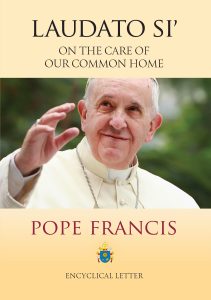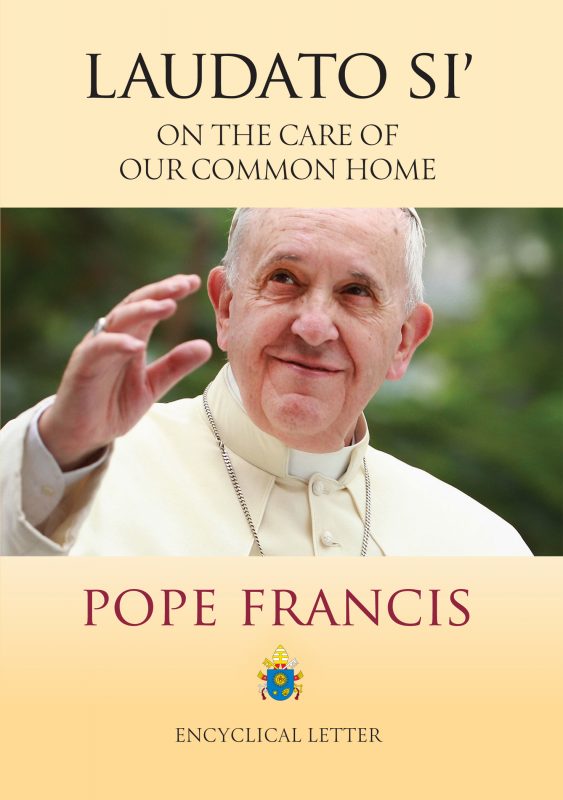LAUDATO SI’ — An Encyclical Letter on Ecology and Climate by Pope Francis (St Paul’s Publications, Australia, 2015); $14.99. Reviewed by SUSAN SMITH.

Recently I was talking with a parishioner who has been challenged and excited by Pope Francis’s ground-breaking
encyclical, Laudato Si’. He believed this would see the local Church encouraging action for the sake of the environment.
Now he is not so certain that this is going to happen; in fact, he is certain nothing very much will happen.
He had been excited because Francis is emerging as a hands-on pastoral leader. Facts are what engage Francis as he wrote this encyclical; the horrifying facts that confront us every day: droughts, famines, floods, climate refugees, loss of diversity in the natural world, or pollution.
These facts concern Francis, as they are going to cause damaging changes in eco-systems around the world, and will mean immense suffering for all, especially the poorest groups in our society.
For Francis, care of the environment and care of the poor and oppressed are essentially linked.
Although Genesis 1:28 has been interpreted to legitimise mankind’s control over the world and its resources, Francis is inviting people to move from such anthropocentric understandings of creation to those that that see humankind not as using and abusing the world, but as living in harmony with creation so that fragile eco-systems are strengthened in ways that benefit all creation.
Is this possible?
Not if governments favour laissezfaire capitalism, which prioritises financial returns over all else.
Francis quotes approvingly the NZ Bishops’ Conference 2008 statement, which asked, “what the commandment ‘Thou shall not kill’ means when 20 per cent of the world’s population consumes resources at a rate that robs the poor nations and future generations of what they need to survive”.
The Pope is adamant that belief in unlimited growth is “based on the lie that there is an infinite supply of the Earth’s goods, and this leads to the planet being squeezed dry beyond every limit”.
This down-to-earth language is quite extraordinary in an encyclical, and is far removed from the arcane language often characteristic of papal encyclicals.
For Francis, everything is related, everything shares a common origin, and therefore every creature must be respected. The Pope writes that “we are part of nature”, something that is not always easy to accept. But what is perhaps most important in our increasingly divided world is Francis’s argument that “the health of a society’s institutions has consequences for the environment and the quality of human life”.
He reminds us that “the environment is on loan to each generation, which must then hand it on to the next”.
If we did not know who was stating things so baldly, we could dismiss Laudato Si’ as a left-wing rant easy enough to ignore. Sadly rightwing politicians everywhere, including Catholic presidential candidate Jeb Bush, have already done this.
One of the challenges facing Christians concerned about environmental issues is how to respond to the papal teaching that human beings do more to damage the environment than other creatures.
Francis asks us to embrace a spirituality that demonstrates awareness “of our common origin, of our mutual belonging, and of a future to be shared with everyone”. This is not something that will happen overnight, and it is here that our parish communities can make an important contribution to humankind’s search for an environmental ethic.
What would happen if our Sunday liturgies had more of an ecological character? Are eucharistic liturgies celebrated in a way that gives new meaning and significance to expressions such as “through your goodness we have this bread to offer, which Earth has given … this wine to offer, fruit of the vine and work of human hands”?
How can we make sure that the words of this wonderful encyclical become flesh, become alive in our damaged world today.
Thank you, Francis, for alerting us to our responsibility for the wellbeing of Mother Earth, Papatūānuku.
Susan Smith (RNDM), from Whangarei, is a member of the Sisters of Our Lady of the Missions.
Time to act on the words of this wonderful encyclical

Posted in Reviews
Reader Interactions